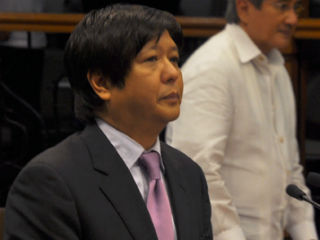Senator Ferdinand “Bongbong” Marcos Jr. was just 15 and in school in the United Kingdom when he received a call that martial law was declared in the Philippines in September 1972.

‘Martial law’ did not ring a bell in the young Bongbong Marcos’ mind back in 1972. Senate PRIB photo
Asked what his reaction was when he learned about it then, the younger Marcos said it did not ring any bell as he was just a high school student at that time.
“Nothing. Nasa eskwelahan ako. Ang tumawag sa akin ‘yung ambassador (to the Court of St. James), it was Jaime Zobel. Tinawagan ako sa eskwelahan ang sabi niya, ‘your father declared martial law.’ ‘Yun lang,” he told GMA News Online in an interview at the Senate session hall.
He added that the declaration did not affect him and never became an issue in his school, Worth School in England, much more with his classmates who were, at that time, not even aware where the Philippines is.
“Hindi ito naging balita sa UK. Wala(ng epekto), well (at least) dun sa eskwelahan dahil hindi naman masyadong malapit sa Pilipinas. Karamihan nga ng kaklase ko hindi alam kung saan ang Pilipinas e so it was…hindi naging malaking balita,” he said.
The senator also did not see anything different when he returned to the Philippines that year for the Christmas break.
“Wala naman(g nagbago). Kasi ine-expect mo ‘pag sinabing martial law puro sundalo ang makikita mo. Ang na-notice ko ‘pag uwi ko, parang hindi naman masyadong visible ‘yung presence ng mga military n’un. At least, not in the city. Wala kaming namamalayang malaking pagbabago,” he said.
Marcos believed that the way government handled its affairs may have changed since then but not the everyday lives of the people.
“Basta nung umuwi kami, siguro sa patakbo ng gobyerno malaki ang nagbago pero sa pang-araw-araw na buhay hindi masyadong nagbago,” said Marcos.
The senator was initially reluctant to talk about what happened 42 years ago.
“Wala ng bagong tanong talaga diyan sa subject na ‘yan,” he said.
He said people who think the Marcoses should be held accountable for the abuses during martial law “have all the avenues for which to pursue any of the grievances. Some of them have.”
“Meron namang opportunity sa kanila na to find reparation or to find a hearing tungkol sa kanilang sitwasyon,” he said.
Personal recollection
He said there that he does not see martial law as something to be considered today and his actions as a local executive and a legislator were consistent with “democratic principles, participatory governance, and the strengthening of institutions that provide the framework for checks and balances among the three branches of government.”
Marcos first served as vice governor of Ilocos Norte at the age of 23 but the EDSA People Power Revolution forced him and his family to leave the country in exile. He returned to the Philippines in 1992, the first among his family, and got elected as representative of the second district of Ilocos Norte.
He ran and won as governor of the province in 1998 and served for three consecutive terms. After nine years of serving the local government, he returned to the House of Representatives in 2007 as congressman of Ilocos Norte. He was elected senator in 2010.
“It (Martial Law) simply is not my cup of tea,” he said.
Marcos also asked the public to move on and move forward and engage in progressive and constructive pursuits. —KG, GMA News
![]()